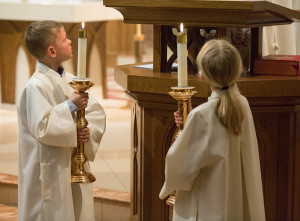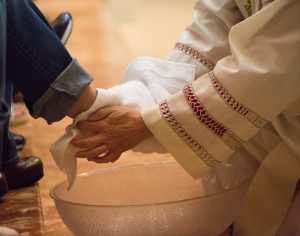MASS OF THE LORD’S SUPPER, 2016
0
Categories: Uncategorized
 With this Mass, we begin our celebration of the Easter Triduum, which recalls the passion, death and resurrection of the Lord, Jesus Christ. At the heart of the Triduum is the cross, with its culmination being the resurrection on Easter Sunday, celebrated in all of its brilliance on Holy Saturday night. In essence, the celebrations over the next three days are all parts of one long Liturgy, just as Jesus’ Last Supper, betrayal, passion, death and resurrection all together make up what we call the Paschal Mystery.
With this Mass, we begin our celebration of the Easter Triduum, which recalls the passion, death and resurrection of the Lord, Jesus Christ. At the heart of the Triduum is the cross, with its culmination being the resurrection on Easter Sunday, celebrated in all of its brilliance on Holy Saturday night. In essence, the celebrations over the next three days are all parts of one long Liturgy, just as Jesus’ Last Supper, betrayal, passion, death and resurrection all together make up what we call the Paschal Mystery. Tonight, Jesus washes the feet of his disciples. Tomorrow, Jesus will wash away the sins of the world with the bath of his blood. Unless Peter allows Jesus to wash his feet, he cannot share in the inheritance of Jesus. Unless Peter bathes in the blood of Jesus, he cannot share the inheritance of eternal life. This is why I like evoking the Father as the table, the Son as food, and the Holy Spirit waiting upon us, because by the Paschal meal, the Paschal Mystery, Jesus shares with us Divine life. This is our inheritance.
Tonight, Jesus washes the feet of his disciples. Tomorrow, Jesus will wash away the sins of the world with the bath of his blood. Unless Peter allows Jesus to wash his feet, he cannot share in the inheritance of Jesus. Unless Peter bathes in the blood of Jesus, he cannot share the inheritance of eternal life. This is why I like evoking the Father as the table, the Son as food, and the Holy Spirit waiting upon us, because by the Paschal meal, the Paschal Mystery, Jesus shares with us Divine life. This is our inheritance.